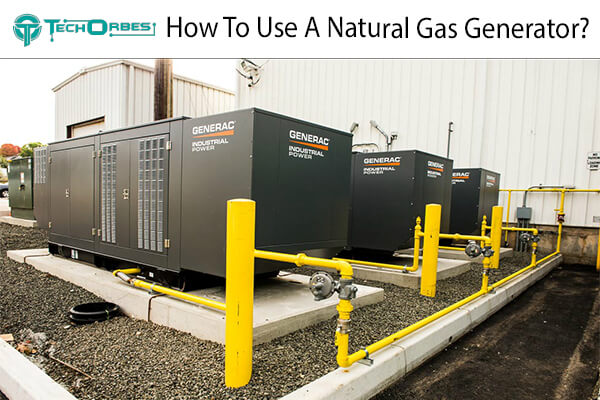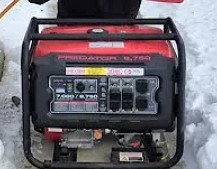How To Use A Natural Gas Generator? Full Procedure
Understanding How To Use A Natural Gas Generator? And how this fuel can benefit you is the first step in making your choice. If you manage a business or industrial building, you know the value of having a standby generator. Power outages occur, so you should always have a backup plan to continue carrying out essential business operations.
Businesses in any industry can benefit from investing in a new or gently used standby generator. Natural gas-powered generators have many advantages to offer when deciding which type of model is best for you. A gas generator can be a lifesaver in many situations, whether lousy weather caused a power outage, maintenance was being done at your place of business, or your home’s electricity ran out.
Table of Contents
How To Use A Natural Gas Generator?
- Open the fuel valve. Turn on the fuel valve.
- Switch on the choke. The choke rod should be moved from right to left.
- Turn the engine switch or the ignition on. The switch on many generators must be flipped for the engine to start.
- Pull the recoil cord.
- Set the engine choke to “run” after the engine has started.

What Is A Natural Gas Generator?
As the name implies, natural gas generators produce electricity using natural gas, which can include methane supplied by utilities through subterranean pipes or propane used for barbecue grills in the backyard.
Typically, they operate similarly to their cousins who use gasoline: A piston in an internal combustion engine compresses the fuel and air mixture after being injected into the combustion chamber.

Fuel is ignited by a spark plug, which causes the piston to descend and turn the crankshaft. Based on the size of the generator, the crankshaft spins the rotor while creating an electromagnetic field that can power high-wattage tools, charge batteries, and power appliances.
Generators for natural gas must be able to burn gaseous fuel instead of liquid fuel in contrast to gasoline or diesel-powered generators. This calls for using a carburetor, a device created mainly to handle pressured gas and combine a precisely calibrated amount of fuel and air before injecting the mixture into the engine’s cylinders.
You can change a gasoline/diesel generator to propane with a conversion kit or buy natural gas generators in portable and industrial capacities. Before trying such a conversion, contact the National Fire Protection Association for crucial safety and legal instructions.
Supporters of natural gas generators highlight many advantages. Because it is transported via underground, wind- and storm-proof lines and is widely available wherever gas grills are sold, natural gas may be simpler to acquire after a disaster (such as the hurricane scenario).
Unlike diesel or gasoline, it is also simpler to store. If diesel is stored incorrectly, it may produce silt, gel, or fungus. The Natural Gas Supply Association asserts that propane can continue to be used indefinitely as long as its container is intact.
Generators powered by natural gas are with problems. One business that supplies home gas generators makes the following claims: while the initial cost maybe 10 to 20% higher than that of a comparable liquid-fueled model, it can pay for itself over time through lower fuel costs because the price of natural gas fluctuates less than the price of petroleum for an equivalent amount of energy. However, seeing that payoff can take five to seven years.
Natural gas, for example, has advantages over oil-based energies that extend well beyond financial gain. Natural gases often burn more efficiently than other fossil fuels, lowering greenhouse gas emissions that contribute to climate change.
Furthermore, a natural gas generator can function just as well with gas obtained from biological sources (methane extracted from landfill trash, for example) as with natural gas obtained from underground gas deposits. A growing number of people and companies are including natural gas in their energy plans as the world transitions from oil-based fuels to a wide range of more sustainable energy sources.
Considerations For Natural Gas Installation
Installing a generator powered by natural gas is an investment in the long-term prosperity of your business. Make sure you’re ready for any difficulties so you can fully enjoy the advantages of this green, energy-saving solution, which may include:
- Problems with fuel supply by connecting to your neighborhood natural gas pipeline, you can typically count on a consistent fuel supply. Natural catastrophes and extreme weather can also strain natural gas supplies, as many homes and businesses in your area fight for the same supply of energy to power their buildings. There may need to be more pipelines in some regions to supply gas to everyone who needs it during times of high demand. Make room in your budget now to prepare for fuel shortages so that you can acquire the fuel you require and pay for any price increases. The price of running the generator may change due to fluctuations in the price of natural gas at specific times of the year. This may impact the entire cost of using a natural gas generator.
- Location: Verify that the space where your generator will be installed can support your optimal fuel levels. Natural gas is abundant in some parts of the United States, such as Texas and North Dakota, although there are often periodic gas shortages in the northeast. Make a backup plan if you intend to install a natural gas generator in an area vulnerable to shortages or natural disasters so that you are always prepared.
- Maintenance needs: Because natural gas generators need more maintenance than diesel generators, you might have to spend more for services more frequently. This is because natural gas generators come equipped with spark ignition as standard. Consider scheduling routine maintenance around scheduled downtime if you still want to take advantage of a natural gas model so you can resume operations as soon as possible.
Advantages Of Natural Gas Generators
Since natural gas is frequently more readily available than a manufactured substitute, a natural gas generator can be beneficial in a calamity, such as in harsh weather or ongoing power outages. Natural gas is transported in underground, weather-resistant lines that are easily accessible at any location that sells gas grills or LPG fuel.
Since natural gas does not often decay, it is simpler to store than oil or diesel. For instance, if diesel is stored improperly, it may harden, create sediment, or grow fungus. The Natural Gas Supply Association claims that as long as the container is unbroken, propane can continue to be used indefinitely.
Finally, compared to other fossil fuels, natural gas tends to burn cleaner with fewer emissions. This can assist in lowering greenhouse gas emissions and your carbon footprint. Natural gas generators may be a practical, helpful alternative for many homes and businesses worldwide as the need for sustainable living increases and we start moving away from oil-based fuels.
Types Of Natural Gas Generators
There are two primary categories of natural gas generators:
Prime
When there is no local utility, prime power generators are employed, making the generated power the only source of power available. Because many households cannot easily connect to a natural gas line and lack any gas connection, this sort of natural gas generator is less prevalent, especially for residential uses. Additionally, the natural gas must be brought by truck if there is no gas hookup to a utility line.
Compared to backup generators, prime power generators can handle significantly more oversized loads and have a far longer operating time. A commercial natural gas generator is often brought to a job site on a trailer or fifth wheel when one is required.
Continuous power generators are a subset of prime power generators. The difference between the two is that although prime generators are designed to run for extended periods at variable loads, continuous generator sets are supposed to run continuously with a constant load.
Standby
Standby generators are frequently used in home, commercial, and industrial settings. In both situations, the natural gas generator is installed permanently and is fueled by the nearby utility company. The standby generator automatically kicks on during power shortages.
Because using a standby generator for longer than is recommended can result in faults and the need for more frequent repairs, it is only designed to run for a short duration during emergencies. While outages occur, they are exceedingly unusual for natural gas because the pipelines are underground and out of the weather, making natural gas generators an excellent option for standby power.
Therefore, households and business owners may count on an endless supply of generator fuel that doesn’t “go bad” like diesel or must be stored in tanks unless located in an earthquake-prone area.
Where Natural Gas Generators Are Used?
Natural gas or diesel generators, as opposed to gasoline-powered ones, are frequently used in hospitals, nursing homes, and other facilities where a constant power source is essential. When you need it most, in an emergency, gasoline can be hard to find since it has a short shelf life.
During natural disasters, propane tanks may also be hard to come by. Additionally, as diesel generators are a well-known source of air pollution, businesses aiming for sustainability require another choice.
Residential standby generator installation chooses natural gas for the same reason, saving the homeowner from constantly cycling through new gasoline. The homeowner doesn’t need to “add” fuel; it simply flows across the utility line as needed.
Sizing A Natural Gas Generator
Let’s start by discussing how big of a generator to buy for your house. (Discussions about portable generators that can run on gasoline, propane, or natural gas are covered here) The number of individual appliances and devices you need to power and the size of your home will dictate what size generator you need. A whole-home generator can either power everything in your home or just a small selection of goods. Typical things consist of:
- Refrigerator
- Central A/C
- Gas heater
- Dryer and washer
- Microwave
- Laptops and TVs
- Pumping a well
- Electric oven
- Security system for homes
The number of items a generator can power increases with its kW rating. A retailer like Generac in the product literature will mention the number of circuits you can power with a particular generator. You can choose only the items you wish to power the most in this manner.
For instance, a 7.5 kW home backup generator could supply eight circuits, whereas an 11 kW generator could power 16. You will have real whole-house backup power if your home has fewer than 16 circuits.
To determine the operating watts and beginning (or surge) watts of the equipment you wish to be able to operate even during a power loss, you’ll need the assistance of an electrician. As certain appliances draw more electricity when they initially switch on, the latter will be higher.
Your generator must meet the beginning watts needed. Analyze your needs and ensure the generator is rated high enough to withstand the peak load when sizing a natural gas generator for industrial application. To get started, consult our generator sizing guide.
Dual-Fuel Generators
Although some generators are designed to only run on natural gas, many can run on propane, diesel, or even gasoline in addition to natural gas. These generators are classified as dual-fuel or tri-fuel. Because it can be challenging to acquire a natural gas hookup while on the go, it might be challenging to find a natural gas-only portable generator.
Dual-fuel and tri-fuel portable generators are much more popular. Numerous industrial generators are also dual-fuel capable, expanding their range of field applications. The operator can continue to access electricity by having propane tanks nearby.
Your generator can be set up to receive natural gas thanks to a conversion kit. You can readily find instructions for doing this online, and your kit will also come with tutorials. You can always hire a pipefitter to do the project for you if you still need to decide about taking on the task yourself. A decent kit will make installing an adapter between the carburetor and the air cleaner easy without requiring any frame adjustments.
Field gas, or the raw gas that leaks from a wellhead during drilling operations, can also be used to power some industrial-strength generators. Typically, this gas is burned off, wasting valuable fuel and harming the environment. An oil well pump jack, a man camp, and other structures can be powered by a generator instead of diesel, which saves its operators money.
Why Choose A Used Natural Gas Generator?
If you’re looking for an industrial generator, a secondhand model may satisfy your requirements. A secondhand natural gas generator offers a number of advantages, such as:
- Convenience: It is simple to install a natural gas generator if your building currently receives natural gas. You don’t need to bother about monitoring fuel tank levels or providing fuel yourself when gas is routed directly to the generator.
- Environmental impact: Purchasing used generators is a fantastic method to repurpose gently used, refurbished equipment and generate less waste.
- Price: Choosing a used model will help you save money on your purchase. You can save up to 70% off a new type of generator by purchasing one from a used appliance merchant, who frequently offers their products at steep discounts.
Conclusion
I hope you understand How To Use A Natural Gas Generator? The best energy solution for many different companies is a generator. Installing a natural gas generator assures you that you’ve selected a machine that burns cleanly and will keep your activities operating until you can reconnect to the power grid.
Trust Woodstock Power Company for first-rate support, including professional customer service representatives accessible for guidance and to assist you through the sales process. We offer the best in commercial and industrial generator sales and excellent prices on purchasing and selling used generators. Along with selling generators, we also offer supplementary services like tune-ups and power accessory rentals.
Frequently Asked Questions
How a gas generator works step by step?
An internal combustion engine produces the mechanical force required to generate a current in a gas-powered generator. An electromagnet is rotated by a shaft spun by the engine (armature). The revolving armature spins inside a stationary magnetic field (stator) to generate an electrical current through copper wiring.
Will a natural gas generator work without electricity?
To guarantee that the lights, heat, and refrigerator always stay on when the grid goes down, many homes are investing in natural gas generators. Natural gas is an excellent fuel option for power outages since it is readily available, according to Jacob VanWormer, associate product manager at Generac Power Systems.

Since childhood, I’ve been fascinated by computer technology, and have experimented with a variety of hardware and software. It was a dream come true to graduate from a renowned university with a degree in computer engineering, which made it possible for me to pursue my dreams swiftly.
